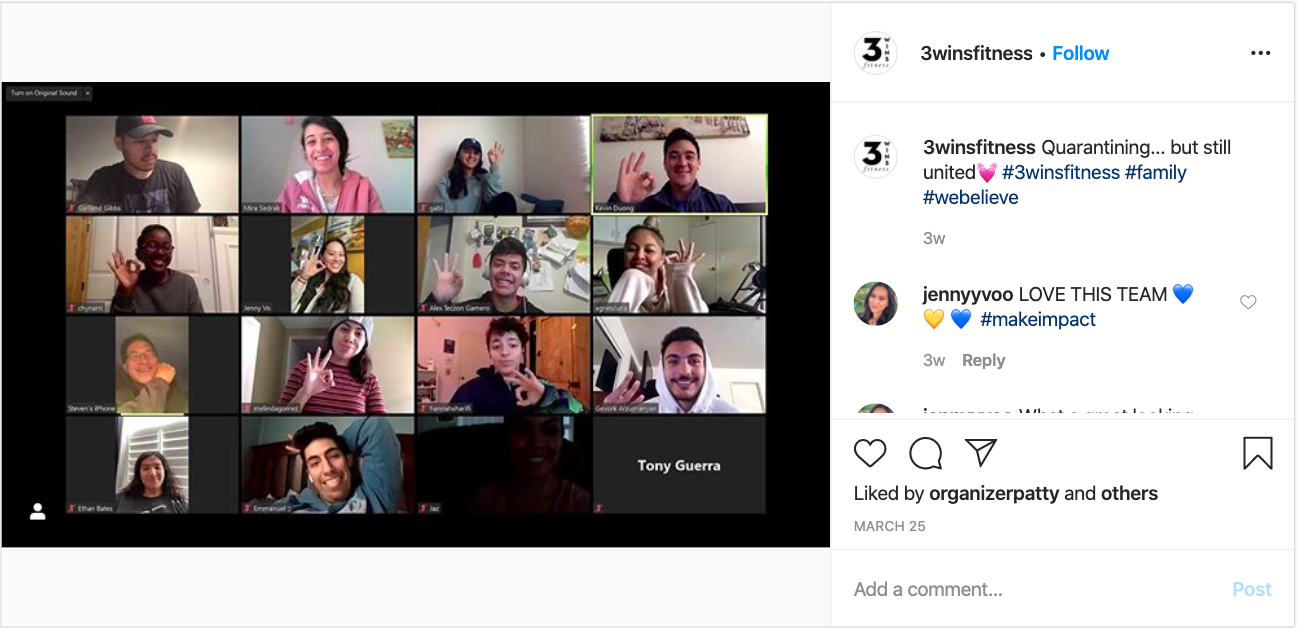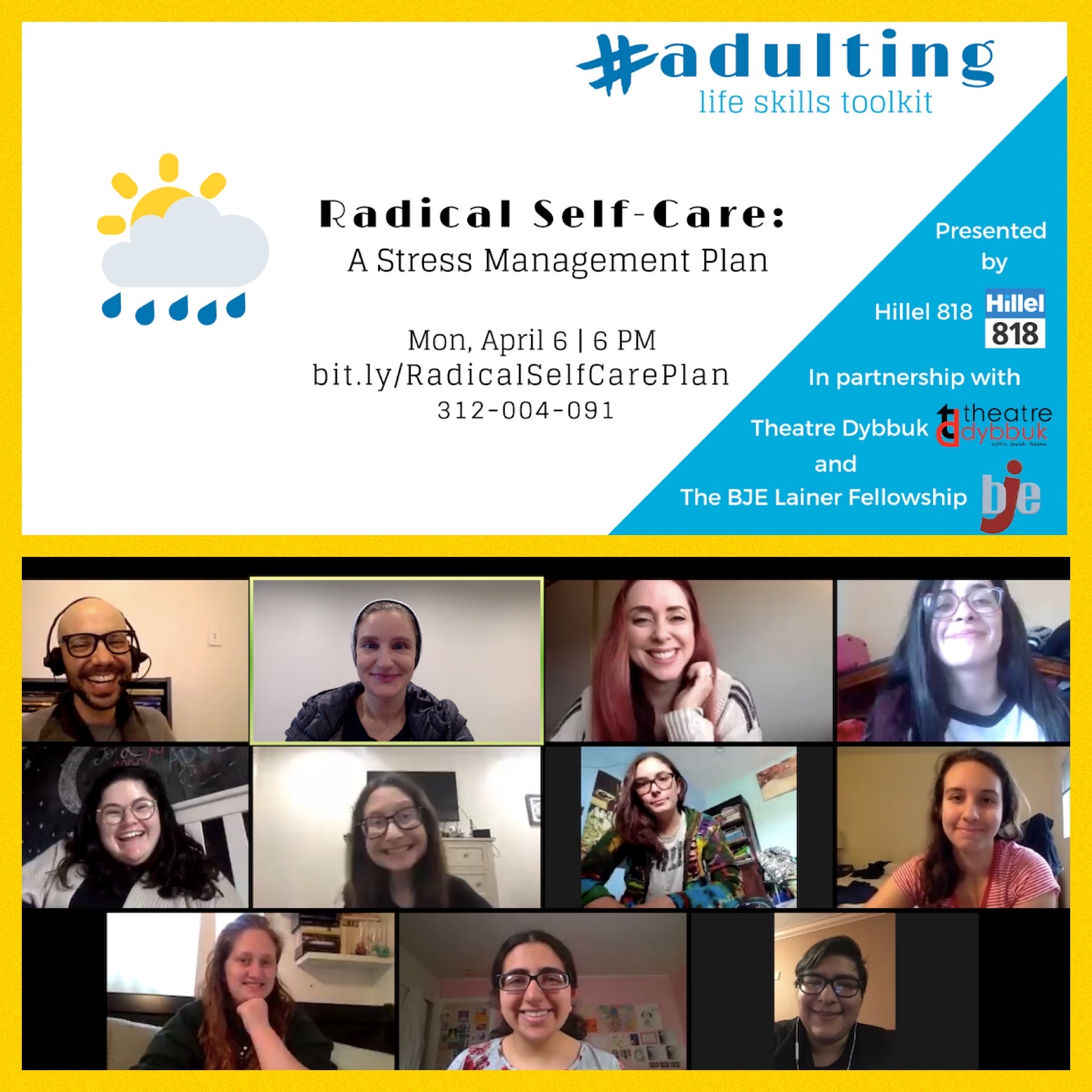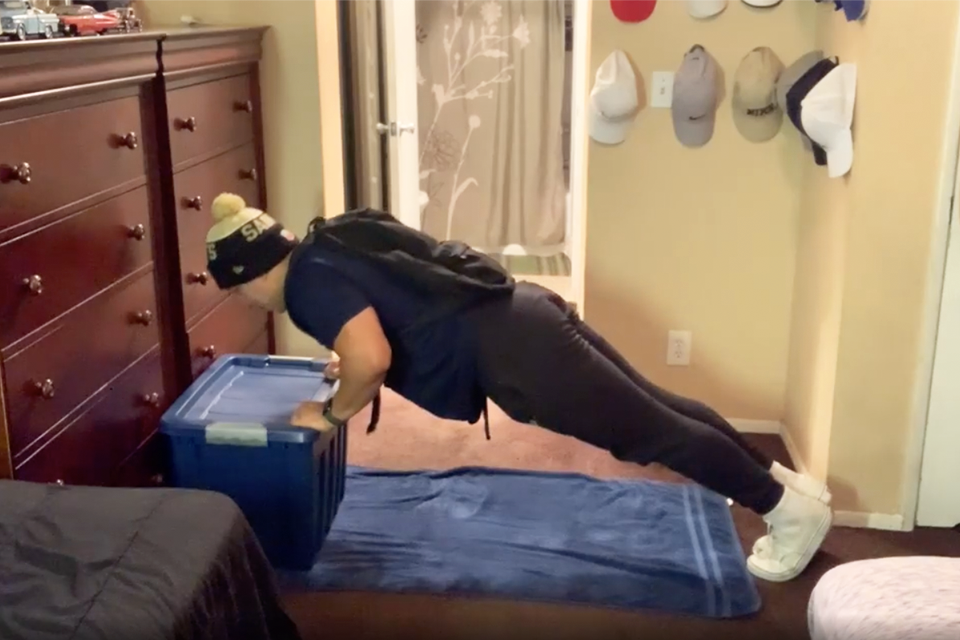No Matter the Distance, CSUN Organizations Stick ‘Together’

CSUN student organizations stay connected while maintaining physical distancing through social media and web conferencing apps, such as Zoom. Photo from 3WINS Fitness on Instagram.
The CSUN chapter of the American Society of Civil Engineers (ASCE) aren’t letting California’s “safer at home” orders stop them from serving the community during these trying times. In fact, they’re letting the circumstances fuel them.
Before the pandemic, ASCE would go far beyond campus to volunteer in decorating children’s hospitals, cleaning up beaches, feeding the homeless on Skid Row and much more. Now, more than just doing their part to slow the spread of COVID-19 by staying at home, ASCE has been using social media and online communications platforms like Slack to mobilize student members to donate blood and contribute to a growing stockpile of handmade face masks.
“We’ve had a lot of members, people that weren’t as involved before even, come to me and ask to play a bigger role and get more involved,” said Pearce Ferriter, a civil engineering senior and ASCE’s outreach coordinator.
As student leaders, he said, they had to find a way to keep the club running, despite canceled events.
“We wanted to lift everyone’s spirits and not let this be a negative experience,” he said.
Just as quickly as the coronavirus spread, the world hit “pause,” pushing many people into isolation at home. In this new reality, ASCE is just one of dozens of CSUN clubs and other student organizations doing what they can to stick together, supporting each other despite the physical distance. Across Los Angeles, the state and wherever Matadors may be, face-to-face fellowship persists in virtual rooms, voices harmonize by harnessing technology and community service carries on inside individual homes. The same unwavering spirit of solidarity lives on as Matadors use the internet and wireless service to stick “together.”
The CSUN calendar is coming back to life with virtual events. Communities housed by the University Student Union — the hub for student gatherings on campus — have constructed virtual spaces for connecting with peers and accessing resources. Through Zoom, students can virtually attend the International and Exchange Student Center‘s Friday Coffee Hours, the Veterans Resource Center‘s lunchtime pop-ins or even the Student Recreation Center‘s group exercise sessions.
CSUN’s Pride Center is also continuing through Zoom their slew of weekly programming, including T-Time, QTPOC Conversations and lunchtime sessions to chat with other LGBTQ Matadors. They are also offering their scheduled “Queer in Your Career” professional development event virtually, through pre-recorded Q&A videos uploaded to YouTube on April 20-24.

Hillel 818 hosts a series of virtual events, such as Radical Self-Care: A Stress Management Plan, for their members to stay involved in the community. Photo taken from Hillel 818 on Facebook.
Hillel 818, an organization that brings together the Jewish communities of CSUN and neighboring community colleges, also has been actively hosting Zoom events. These include “Tea Time,” where students can socialize; “Radical Self-Care,” a series of sessions covering mental health topics and meditation; and “Tasty Tuesdays,” a home cooking class where students learn recipes such as oatmeal cookies and homemade pasta.
Sharona Schnall, a CSUN sophomore, has been attending many of Hillel 818’s events, including the recent ones conducted online. Despite the events having smaller groups than they would in the organization’s physical space on Meridy Street (while its permanent home on Plummer Street is being renovated), she said, “I was grateful at how refreshing and nice it was to stay connected with the community. … It’s important to keep the community connected during these circumstances, to stay motivated, positive, united and hopeful.”
A number of other CSUN clubs and organizations are taking advantage of technology to stay engaged with their members.
ACASOLA, CSUN’s popular a cappella club, may not be performing at its usual spot in front of Sierra Hall, but on Instagram, the group sings on. Recently, ACASOLA shared a video of one of its members singing a cover of an R&B track, and the group put its talents to good use, singing “Happy Birthday” to brighten another member’s special day.

3WINS Fitness regularly posts guides and instructional videos for workouts the CSUN community can do at home. Photo taken from 3WINS Fitness on Instagram.
The CSUN kinesiology students with 3WINS Fitness are still doing their part in motivating the Matador community to stay fit, even at home. On Instagram, they’ve shared workout guides and videos that anyone can follow at home.
The Filipino American Student Association (FASA) has been consistently active on social media for years, with frequent updates, alumni spotlights and “Tagalog Thursdays,” where members can learn a new phrase in the Filipino language every week. But now, FASA is taking the connection beyond social media. On April 7, it announced FASA Mail, through which members can send out postcards to one another and even to alumni and the greater community of the Southern California Pilipinx-American Student Alliance. The postcards sport a hand-drawn design of a rising phoenix surrounded by the words, “No matter how far we are, we are always connected.”
Along with their robust community service projects, ASCE also has been hosting weekly information sessions, professional development and networking events through Zoom. Via Instagram stories, the chapter also has invited students to share their favorite ASCE memory over the past year, to keep things positive.
“Our members didn’t see the quarantine as an excuse to just sit there,” said Emily Garcia, ASCE vice president, who said she was pleasantly surprised by her peers’ positive response to the club’s virtual operations. “Just because we’re isolated doesn’t mean this community we’ve built should dismantle.”

 experience
experience